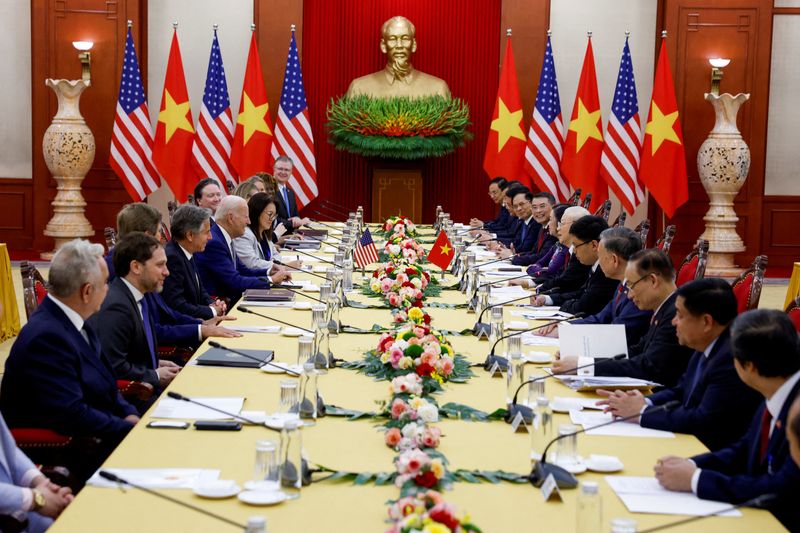(Reuters) - The United States and Vietnam agreed on Sunday to upgrade their diplomatic relations in a historic step for the two former foes, paving the way for business deals and possible new investment. But for every winner there is often a loser.
These nations, companies and groups are unlikely to benefit from closer relations between Washington and Hanoi:
CHINA
Vietnam has been careful to stress that its elevated ties with Washington would not upset relations with Beijing, fearing a backlash from China.
But Washington's elevation to the same tier as Beijing in Vietnam's ranking will inevitably have an impact on China.
Beijing could lose business deals, especially in the semiconductors field, where Washington pledged to boost Vietnam's industry with the explicit goal of reducing the sector's exposure to China-related risks.
"China believes that the development of bilateral relations between countries cannot target third parties," China's foreign affairs ministry spokesperson Mao Ning said on Monday, urging the U.S. to "abandon hegemony and Cold War thinking".
RUSSIA
Vietnam is a close partner of Russia and one of the top importers of its weapons, which are estimated to comprise about 80% of the Southeast Asian country's arsenal.
The White House had no new arms deals to announce, but the new ties may facilitate future supplies from the U.S. or its partners.
That would inevitably reduce Vietnam's reliance on Russian gear, although Hanoi is currently negotiating a new possible arms deal with Moscow.
AIRBUS
During U.S. President Joe Biden's visit to Hanoi, U.S. planemaker Boeing (NYSE:BA) agreed to sell 50 of its 737 MAX jets to flag carrier Vietnam Airlines.
The Vietnamese company currently operates narrowbody jets from Airbus, Boeing's direct rival.
The deal marked what is known in the industry as a "flip" - when either Boeing or Airbus poach a customer from each other, especially in the ultra-competitive narrowbody market.
Such defections are relatively rare because of the expense of introducing new pilot training and spare parts, as well as the complexity of switching to a new fleet.
"We do not have any comment on a decision that does not involve Airbus," an Airbus spokesperson said. "However, Vietnam Airlines is an important customer and we look forward to building further on our long-standing partnership."
HUMAN RIGHTS
The White House fact sheet issued during Biden's visit weighed in at over 2,600 words. The section on human rights contained just 112 words, including a sub-heading.
"The Biden administration is clearly sidelining human rights in the interest of advancing partnerships with governments it sees as strategically important," said Carolyn Nash, Asia advocacy director at Amnesty International.
Vietnam holds at least 159 political prisoners and at least 22 others were in detention pending eventual trial before a court controlled by the ruling Communist Party, Human Rights Watch said.
The two countries agreed on Sunday on "enhanced commitment to meaningful dialogue".
MALAYSIA AND INDIA
Washington has agreed to significantly boost support to Vietnam's chip and artificial intelligence industry, announcing new investments from U.S. companies, including a $1.6 billion semiconductors factory to be built by Amkor (NASDAQ:AMKR), and partnerships between U.S. AI giants Nvidia (NASDAQ:NVDA) and Microsoft (NASDAQ:MSFT) and Vietnamese companies.
That could affect Malaysia and India, Vietnam's top rivals among emerging Asian nations in semiconductors and AI, respectively.
AES (NYSE:AES) AND SIEMENS
Among the deals announced by the White House was a partnership between solar company AMI and U.S. conglomerate Honeywell (NASDAQ:HON) to launch "Vietnam's first ever battery energy storage system".
That may have not pleased Fluence, a Nasdaq-listed company whose parent organisations are U.S. energy firm AES and Germany's Siemens that produces battery energy storage systems in Vietnam through a supplier.

At the moment, its Vietnam output is exported.
Fluence and Siemens did not reply to requests for comment. AES did not comment.